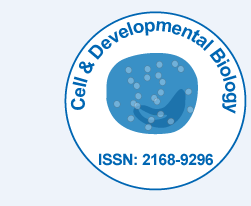
Cell & Developmental Biology
Open Access
ISSN: 2168-9296

ISSN: 2168-9296
Brijesh Gupta and Manchikatla Venkat Rajam
The co-transformation system using mixture of two Agrobacterium cultures, one harbouring bacterial mannitol-1- phosphate dehydrogenase (mtlD) as gene of interest, whereas the other harboring the neomycin phosphotransferase (nptII) marker gene for selection, was successfully used to develop selectable marker-free transgenics of tomato with engineered mannitol accumulation, to improve tolerance against multiple abiotic stresses. We have achieved high co-transformation frequency (up to 24%), and segregation frequency (up to 22-24%) for obtaining marker-free transgenics. Marker-free transgenic tomato plants resulted in mannitol accumulation, as evident by HPLC analysis, that leads to substantial protection of the vigour of the plants under multiple abiotic stress conditions, such as high salinity (up to 200 mM NaCl), drought (up to 15% PEG), and heavy-metal toxicity (up to 2 mM CdCl2). Under stress, transgenics performed well in comparison to wild type (WT), with high percentage of seed germination and seedling growth both in vitro and in vivo. They also performed better than WT, in terms of high chlorophyll content and other photosynthetic parameters such as Fv/Fm ratio, Electron Transport Rate (ETR), photosynthetic yield, and low Non Photochemical Quenching (NPQ). Thus, high mannitol level not only increases the nutritional value of the fruit, but also improves tolerance of transgenic tomato plants by increasing its physiological and photosynthetic efficiency, suggesting that carbohydrate alterations produced by mannitol biosynthesis may be linked to the stress response.